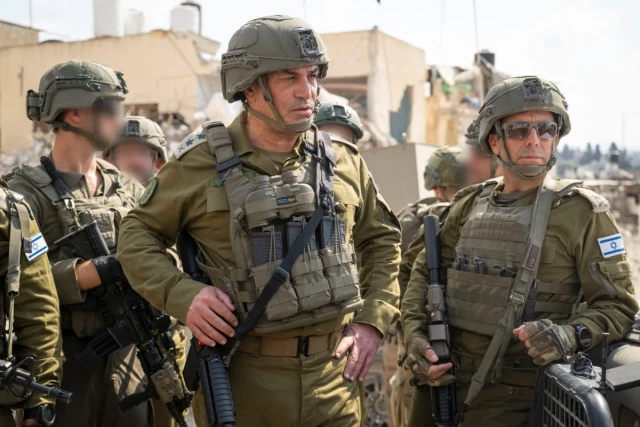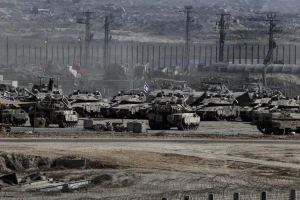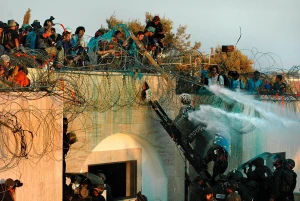Why is IDF Chief Zamir warning about military occupation in Gaza?
Understanding the concern over claims of occupation and international law

In a recent cabinet meeting, IDF Chief of Staff Lt. Gen. Eyal Zamir warned against the government’s plan, exemplified in Operation Gideon’s Chariots II, to conquer the full Gaza Strip in an effort to defeat Hamas militarily and secure the release of the remaining Israeli hostages.
After expressing the IDF’s reservations about the plan, and being told by the ministers of their intention to go ahead with it, Zamir warned that the operation would result in a “military government.”
“Let it be clear that we are going to a military government,” Zamir was reported by Maariv to have told the ministers. “You are voting for a military government.”
So why is Zamir opposed to a military occupation of the Gaza Strip, even temporarily, as an outcome of the Gaza war?
Gaza and Israel
After the 1948 War for Independence, Gaza became a part of Egypt, just as the territories of Judea and Samaria were captured by Jordan. Both were cleared of Jewish inhabitants during the fighting, as Arab armies forced the Jewish residents to flee for their lives, abandoning homes and possessions.
After Egypt attempted to block the majority of Israeli shipping in 1956, by blockading the Gulf of Aqaba and preventing ships traveling to or from Israel from using the Suez Canal, Israel, along with England and France, started the Suez War, in which Israel also seized control of the Sinai Peninsula and the Gaza Strip. After a four month military occupation of Gaza, Israel agreed to withdraw its forces from both the Sinai and Gaza, in exchange for a guarantee that Israeli shipping could traverse the Suez Canal.
The next period of Israeli military occupation in Gaza began following the Six-Day War in 1967. Israel launched a preemptive attack on Egypt, Syria, and Jordan after Egypt again attempted to impose a blockade on Israeli shipping at the Straits of Tiran.
Following that war, Israel imposed a military governance on the Arab territories it had captured: the Sinai Peninsula, the Gaza Strip, Judea and Samaria, and part of the Golan Heights. That governance followed the guidelines expressed in the Fourth Geneva Convention for military rule of occupied territories.
Direct military rule over the Gaza Strip and Judea and Samaria was later turned into a civil rule under the authority of the Coordinator of Government Activities in the Territories (COGAT), in the Israeli Civil Administration. However, this body remained under the Ministry of Defense.
As part of the Oslo Accords, the Israeli Civil Administration handed over some administrative authority to the Palestinian Authority in Gaza and also in Area A of Judea and Samaria. In practice, due to the presence of several Israeli settlements in Gaza, the IDF maintained multiple checkpoints or observation posts within Gaza. That continued until the implementation of the Disengagement Plan in 2005.
However, both before and after the implementation of the Oslo Accords, Palestinian terror groups – such as Hamas, Fatah, and various other factions – demonstrated the inherent problems of imposing Israeli rule. Their ability to organize attacks during the First and Second Intifadas reflected a population raised to see Israel as the enemy and the Jews as those who stole their land.
Despite this troubled history, there are many in the coalition government who think the solution to the problem is to annex Gaza at the end of the war, or at least undo the Disengagement Plan by allowing the establishment of Jewish settlements in the Strip.
Such a move would most likely require some form of military occupation to prevent friction between Palestinians and Israelis.
The legal reasons Zamir opposes military occupation
Beyond the troubled history, Eyal Zamir also knows that the imposition of military governance in Gaza will bring with it legal requirements, as an occupying power, which most of the Israeli public, currently experiencing low levels of trust and empathy in relation to Gazans as a result the Oct. 7, 2023, Hamas massacres and the resulting Gaza war, is not keen to fulfill.
As an occupying power, International Humanitarian Law (IHL) would require Israel to provide the basic needs for the population of Gaza. Israel would be required to ensure Gaza has an adequate supply of food, medical supplies, and other basic goods as part of Article 55 of the Fourth Geneva Convention.
As an occupying power, Israel would be entitled to enact security and control measures (Art. 27 of the 4th Geneva Convention) over the Gaza population, including restrictions on the flow of certain goods into Gaza for security reasons. However, in practice, Israel already knows that such a situation, deeply unpopular in the international community, is easily weaponized by states and organizations hostile to Israel.
Defeating Hamas and implementing the Trump Plan
As Israel prepares to launch Operation Gideon’s Chariots II, and complete the takeover of Gaza City, followed soon after by the conquest of the central camps, it currently faces several options:
It could take Zamir’s advice, accepting the Egyptian hostage-ceasefire proposal, which would guarantee the release of half of the remaining living hostages, along with half of the deceased hostages, while attempting to secure an acceptable security arrangement through negotiations during the 60-day ceasefire. This would likely not include the total defeat and exile of Hamas from Gaza.
It could take Zamir’s other suggestion, and impose a siege on Gaza City, maintaining its current hold on 75% of the Gaza Strip, while wearing Hamas down through raids in the attempt to secure a better hostage-ceasefire deal. This option would expose Israel to further accusations of human rights abuses, famines, etc., if the civilian population of Gaza City decides not to evacuate, realizing that Israel does not intend to fully conquer the city.
It can go ahead with Operation Gideon’s Chariots II, and complete a full military takeover of the Gaza Strip. This option would likely take the longest, but would achieve the total defeat of Hamas as a military and governing force within the Gaza Strip.
Despite almost two years of war, Hamas still maintains both a large military force, estimated to be at least 5,000 fighters, along with control over some civil/municipal systems. This is seen in the group’s continued ability to confiscate UN aid shipments, as well as crude policing of civilians who attempt to do the same.
An outcome which leaves Hamas in some form of authority, even drastically weakened, would be perceived as a form of victory for many of its supporters, as it validates one of the group’s core values, that of sumud (steadfastness). It would also preserve an Iranian proxy force in an area of strategic value to Israel’s enemies.
However, the recent discussions of the GREAT Trust plan for a post-war Gaza reconstruction effort could provide Israel a way out of the military occupation dilemma.
The military operations necessary to defeat Hamas will likely result in the the destruction of most of the remaining Gaza infrastructure. The assessment of Israel and the U.S. of over 30,000 pieces of unexploded ordnance throughout the Gaza Strip also means that the enclave will be unsafe for such a large population until significant reconstruction can be accomplished.
While the Israeli government has discussed building a tent city in the area of Rafah, which has already been completely demolished, its plans only called for the housing of around 500,000-600,000 people.
The GREAT Trust, a proposal for implementing President Trump’s vision to turn Gaza into the “Riviera of the Middle East,” with its plan to offer financial aid to Gazans who willingly emigrate, and a guarantee of housing units in a reconstructed Gaza to those who place their private property in the trust, offers a possible offramp for Israel's military occupation of Gaza, possibly shortening it to a period of months. It suggests that while Zamir’s concerns are understandable, the current situation regarding post-war Gaza is different than those which Israel has previously faced.

J. Micah Hancock is a current Master’s student at the Hebrew University, pursuing a degree in Jewish History. Previously, he studied Biblical studies and journalism in his B.A. in the United States. He joined All Israel News as a reporter in 2022, and currently lives near Jerusalem with his wife and children.
You might also like to read this:











